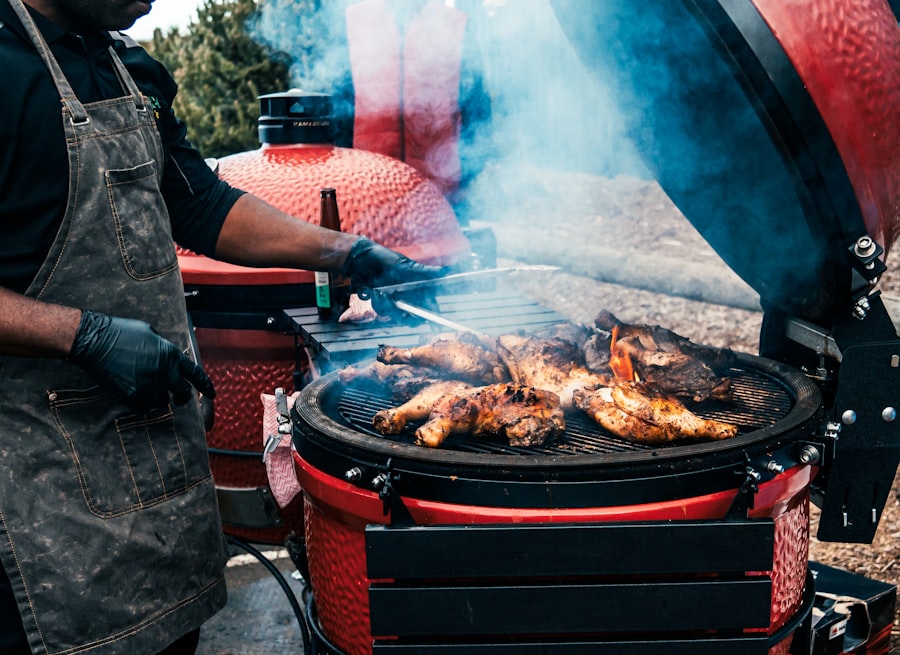Grilled chicken is a widely consumed and adaptable protein source that can be incorporated into various meals, including salads, sandwiches, and main dishes. As with all perishable foods, proper storage of grilled chicken is crucial to maintain its safety and quality. Inadequate storage can result in spoilage and potential foodborne illnesses, making it essential to adhere to guidelines for refrigeration and handling.
This article will examine the recommended practices for storing grilled chicken, covering topics such as refrigeration guidelines, factors influencing shelf life, indicators of spoilage, safe handling procedures, methods for extending shelf life, and a summary of key points.
Table of Contents
- 1 Guidelines for Refrigerating Grilled Chicken
- 2 Factors Affecting the Shelf Life of Grilled Chicken
- 3 Signs of Spoilage in Grilled Chicken
- 4 Safe Handling and Storage Practices for Grilled Chicken
- 5 Tips for Extending the Shelf Life of Grilled Chicken
- 6 Conclusion and Summary
- 7 FAQs
- 7.1 How long can you keep grilled chicken in the refrigerator?
- 7.2 How should grilled chicken be stored in the refrigerator?
- 7.3 Can grilled chicken be frozen for longer storage?
- 7.4 How can you tell if grilled chicken has gone bad?
- 7.5 Can reheated grilled chicken be stored again in the refrigerator?
Key Takeaways
- Proper storage of grilled chicken is essential for maintaining its quality and safety.
- Refrigerate grilled chicken within 2 hours of cooking to prevent bacterial growth.
- Factors such as temperature, packaging, and moisture can affect the shelf life of grilled chicken.
- Signs of spoilage in grilled chicken include changes in color, texture, and odor.
- Follow safe handling practices and use airtight containers to extend the shelf life of grilled chicken.
Guidelines for Refrigerating Grilled Chicken
Time Frame for Refrigeration
The USDA recommends refrigerating grilled chicken within two hours of cooking. However, if the temperature is above 90°F, the time frame for refrigeration decreases to one hour.
Proper Storage and Cooling
When refrigerating grilled chicken, it is important to store it in shallow airtight containers or resealable plastic bags to prevent cross-contamination and to maintain the quality of the meat. It is also important to allow the grilled chicken to cool to room temperature before refrigerating it, as placing hot food directly in the refrigerator can raise the internal temperature of the appliance and potentially compromise the safety of other perishable items.
Labeling and Tracking
Additionally, it is important to label the containers with the date of preparation to keep track of the storage time. By following these guidelines for refrigerating grilled chicken, you can ensure that it remains safe and delicious for consumption.
Factors Affecting the Shelf Life of Grilled Chicken
Several factors can affect the shelf life of grilled chicken, including temperature, packaging, and moisture content. Temperature plays a significant role in determining the shelf life of grilled chicken. Refrigeration at temperatures below 40°F is essential for slowing down bacterial growth and maintaining the quality of the meat.
Additionally, proper packaging is crucial for extending the shelf life of grilled chicken. Airtight containers or resealable plastic bags help prevent exposure to air and moisture, which can accelerate spoilage. The moisture content of grilled chicken also affects its shelf life.
Excess moisture can lead to bacterial growth and spoilage, so it is important to pat the grilled chicken dry before refrigerating it. By considering these factors and taking appropriate measures, such as refrigerating at the right temperature, using proper packaging, and managing moisture content, you can extend the shelf life of grilled chicken and minimize food waste. The shelf life of grilled chicken can be influenced by various factors, including temperature, packaging, and moisture content.
Temperature is a critical factor in determining the shelf life of grilled chicken. Refrigeration at temperatures below 40°F is essential for slowing down bacterial growth and preserving the quality of the meat. Proper packaging is also crucial for extending the shelf life of grilled chicken.
Airtight containers or resealable plastic bags help prevent exposure to air and moisture, which can accelerate spoilage. The moisture content of grilled chicken is another important consideration. Excess moisture can lead to bacterial growth and spoilage, so it is important to pat the grilled chicken dry before refrigerating it.
By taking these factors into account and implementing appropriate measures, such as refrigerating at the right temperature, using proper packaging, and managing moisture content, you can extend the shelf life of grilled chicken and reduce food waste.
Signs of Spoilage in Grilled Chicken
It is important to be able to recognize the signs of spoilage in grilled chicken to avoid consuming unsafe food. Some common signs of spoilage in grilled chicken include changes in color, texture, and odor. If the grilled chicken appears discolored or has developed a slimy texture, it may be an indication that it has spoiled.
Additionally, a sour or off-putting odor is a clear sign that the grilled chicken has gone bad and should not be consumed. It is important to inspect grilled chicken carefully before consuming it and to discard any portions that show signs of spoilage. By being aware of these signs and promptly discarding spoiled grilled chicken, you can reduce the risk of foodborne illness and ensure that you are consuming safe and high-quality food.
Recognizing the signs of spoilage in grilled chicken is essential for avoiding consumption of unsafe food. Common signs of spoilage in grilled chicken include changes in color, texture, and odor. Discoloration or a slimy texture are indications that the grilled chicken has spoiled and should not be consumed.
Additionally, a sour or off-putting odor is a clear sign that the grilled chicken has gone bad and should be discarded. It is important to carefully inspect grilled chicken before consuming it and to discard any portions that show signs of spoilage. By being vigilant about these signs and promptly discarding spoiled grilled chicken, you can minimize the risk of foodborne illness and ensure that you are consuming safe and high-quality food.
Safe Handling and Storage Practices for Grilled Chicken
Safe handling and storage practices are essential for maintaining the safety and quality of grilled chicken. When handling raw or cooked grilled chicken, it is important to wash hands thoroughly with soap and water before and after touching the meat to prevent cross-contamination. Additionally, it is important to use separate cutting boards and utensils for raw and cooked chicken to avoid spreading bacteria.
When storing grilled chicken in the refrigerator, it should be placed on the bottom shelf to prevent any potential drips from contaminating other foods. It is also important to keep raw and cooked foods separate in the refrigerator to prevent cross-contamination. By following these safe handling and storage practices, you can minimize the risk of foodborne illness and ensure that your grilled chicken remains safe for consumption.
Safe handling and storage practices are crucial for maintaining the safety and quality of grilled chicken. When handling raw or cooked grilled chicken, it is important to wash hands thoroughly with soap and water before and after touching the meat to prevent cross-contamination. Using separate cutting boards and utensils for raw and cooked chicken is also essential for avoiding the spread of bacteria.
When storing grilled chicken in the refrigerator, placing it on the bottom shelf can prevent potential drips from contaminating other foods. Keeping raw and cooked foods separate in the refrigerator is also important for preventing cross-contamination. By adhering to these safe handling and storage practices, you can reduce the risk of foodborne illness and ensure that your grilled chicken remains safe for consumption.
Tips for Extending the Shelf Life of Grilled Chicken

Portioning for Easy Reheating
One effective tip for extending the shelf life of grilled chicken is to portion it out into smaller servings before refrigerating it. This allows for easier reheating and reduces the likelihood of exposing unused portions to air and moisture during storage.
Marinating for Preservation
Another helpful tip is to marinate grilled chicken before cooking it. Marinades can help preserve moisture and enhance flavor, thereby extending its shelf life.
Freezing for Long-Term Storage
Freezing excess grilled chicken is another effective way to prolong its shelf life significantly. By freezing it, you can store it for a longer period and reduce food waste.
By following these tips and implementing proper storage practices, you can extend the shelf life of grilled chicken and minimize food waste.
Conclusion and Summary
In conclusion, proper storage of grilled chicken is essential for maintaining its safety and quality. Guidelines for refrigerating grilled chicken include prompt refrigeration within two hours of cooking at temperatures below 40°F, using shallow airtight containers or resealable plastic bags, allowing the meat to cool before refrigeration, and labeling containers with preparation dates. Factors affecting the shelf life of grilled chicken include temperature, packaging, and moisture content, while signs of spoilage include changes in color, texture, and odor.
Safe handling practices involve washing hands thoroughly when handling raw or cooked chicken, using separate cutting boards and utensils, placing grilled chicken on the bottom shelf in the refrigerator, and keeping raw and cooked foods separate. Tips for extending the shelf life of grilled chicken include portioning out servings before refrigeration, marinating before cooking, and freezing excess portions. By following these guidelines and best practices for storing grilled chicken, you can ensure its safety and enjoy its delicious flavor for longer periods while minimizing food waste.
If you’re wondering how long you can keep grilled chicken in the refrigerator, you may also be interested in learning about the best chicken coop run plans. Check out this article for tips on creating a safe and comfortable space for your chickens to roam.
FAQs
How long can you keep grilled chicken in the refrigerator?
Grilled chicken can be safely stored in the refrigerator for 3-4 days.
How should grilled chicken be stored in the refrigerator?
Grilled chicken should be stored in an airtight container or wrapped tightly in plastic wrap to prevent it from drying out and to keep it fresh.
Can grilled chicken be frozen for longer storage?
Yes, grilled chicken can be frozen for longer storage. It can be kept in the freezer for up to 2-6 months.
How can you tell if grilled chicken has gone bad?
If grilled chicken has an off smell, unusual color, or slimy texture, it has likely gone bad and should be discarded.
Can reheated grilled chicken be stored again in the refrigerator?
It is not recommended to store reheated grilled chicken in the refrigerator again, as it increases the risk of bacterial growth and foodborne illness. It’s best to only reheat the amount of chicken that will be consumed.
Meet Walter, the feathered-friend fanatic of Florida! Nestled in the sunshine state, Walter struts through life with his feathered companions, clucking his way to happiness. With a coop that’s fancier than a five-star hotel, he’s the Don Juan of the chicken world. When he’s not teaching his hens to do the cha-cha, you’ll find him in a heated debate with his prized rooster, Sir Clucks-a-Lot. Walter’s poultry passion is no yolk; he’s the sunny-side-up guy you never knew you needed in your flock of friends!







